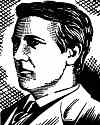|
A Radio Talk by Charles F. Kettering Edison's ideas have invaded almost every phase of our daily life. We pick up a telephone and his handiwork is there. We push a switch and Edison's idea illuminates the room. We put a record on a phonograph and Edison makes it come to life. He helped create the electrical age and made the world of motion pictures. Edison has made our world a more convenient, a more interesting and a much better place in which to live. And what is just as important, he created millions of new jobs.  Nearly all of us are familiar with the story
of the first
incandescent lamp, his
experiments with the phonograph and motion
pictures, but perhaps some of the other highlights in his life are not
so well known.
Nearly all of us are familiar with the story
of the first
incandescent lamp, his
experiments with the phonograph and motion
pictures, but perhaps some of the other highlights in his life are not
so well known. Edison never seemed to have enough to do. Even while working fifteen hours a day as a train newsboy, on the side he learned telegraphy and set up an amateur printing press in the mail car. His education consisted of observing, doing and reading. Later when he became an expert telegraph operator, he still found time to continue his studies. |








